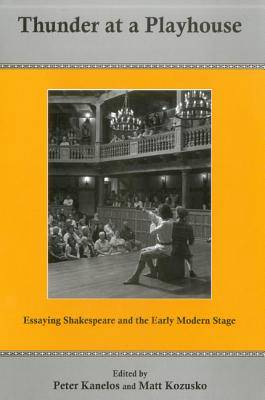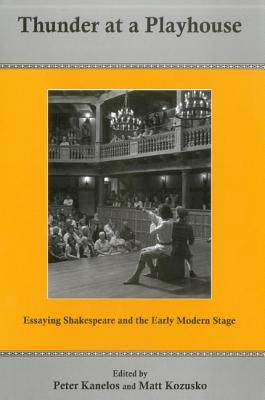
- Afhalen na 1 uur in een winkel met voorraad
- Gratis thuislevering in België vanaf € 30
- Ruim aanbod met 7 miljoen producten
- Afhalen na 1 uur in een winkel met voorraad
- Gratis thuislevering in België vanaf € 30
- Ruim aanbod met 7 miljoen producten
Zoeken
Thunder at a Playhouse
Essaying Shakespeare and the Early Modern Stage
Peter Kanelos, Matthew Kozusko
€ 104,95
+ 209 punten
Omschrijving
What happens when scholarship on the early modern stage is presented on a recreation of an early modern stage? This question, which at its heart is the question of the relationship between scholarship and performance, animates Thunder at a Playhouse: Essaying Shakespeare and the Early Modern Stage. The essays in this collection all began as papers given at the Blackfriars Conference, a biennial gathering that "stages" scholarship by asking presenters to use the space of the stage, the playhouse, the audience, and even actors to test out suppositions and hypotheses about early English theater. Recognizing the slipperiness of putting theory into practice and of having practice inform theory, the editors, Peter Kanelos and Matt Kozusko, committed to the root concept of the essay as "attempt," asked the volume's contributors to develop their positions as fully and as presently possible. The result is a collection of work by both distinguished and emerging scholars that engages critical issues of early modern performance in fresh and vital ways.
The construction of "early modern" playhouses, such as the Blackfriars in Virginia and Shakespeare's Globe in London, and the increasing interest in exploring "original practices" on the early modern stage, have provoked reflection, deliberation, and debate. What might we understand empirically about early modern theater, and what is the value of speculative reconstruction/speculation? How might this sort of knowledge be employed on the modern stage? And, critically, what are the purposes of such pursuits for scholars and theater practitioners? Intending to acknowledge the array of lively approaches to early modern theater and to encourage conversation and collaboration between scholars, the editors have compiled a wide-ranging selection of essays. Featuring new work by David Bevington, Roslyn Knutson, Lars Engle, Peter Hyland, Lois Potter and others, Thunder at a Playhouse offers insight into such varied topics as Hamlet's highbrow conception of drama, the portrayal of barbers, babies, and angels on the early modern stage, the timing of quick changes in Jonson's The Alchemist, Shakespeare's reading of Marlowe, and James Burbage's intentions in purchasing the Blackfriars.
Thunder at a Playhouse will be of interest to anyone concerned with theatrical performance, the history of the stage, or early modern literary culture. This collection is particularly timely, speaking to an directly addressing the convergence of theory and practice in the study of early modern drama
The construction of "early modern" playhouses, such as the Blackfriars in Virginia and Shakespeare's Globe in London, and the increasing interest in exploring "original practices" on the early modern stage, have provoked reflection, deliberation, and debate. What might we understand empirically about early modern theater, and what is the value of speculative reconstruction/speculation? How might this sort of knowledge be employed on the modern stage? And, critically, what are the purposes of such pursuits for scholars and theater practitioners? Intending to acknowledge the array of lively approaches to early modern theater and to encourage conversation and collaboration between scholars, the editors have compiled a wide-ranging selection of essays. Featuring new work by David Bevington, Roslyn Knutson, Lars Engle, Peter Hyland, Lois Potter and others, Thunder at a Playhouse offers insight into such varied topics as Hamlet's highbrow conception of drama, the portrayal of barbers, babies, and angels on the early modern stage, the timing of quick changes in Jonson's The Alchemist, Shakespeare's reading of Marlowe, and James Burbage's intentions in purchasing the Blackfriars.
Thunder at a Playhouse will be of interest to anyone concerned with theatrical performance, the history of the stage, or early modern literary culture. This collection is particularly timely, speaking to an directly addressing the convergence of theory and practice in the study of early modern drama
Specificaties
Betrokkenen
- Auteur(s):
- Uitgeverij:
Inhoud
- Aantal bladzijden:
- 269
- Taal:
- Engels
- Reeks:
Eigenschappen
- Productcode (EAN):
- 9781575911267
- Verschijningsdatum:
- 1/07/2010
- Uitvoering:
- Hardcover
- Formaat:
- Genaaid
- Afmetingen:
- 160 mm x 234 mm
- Gewicht:
- 517 g

Alleen bij Standaard Boekhandel
+ 209 punten op je klantenkaart van Standaard Boekhandel
Beoordelingen
We publiceren alleen reviews die voldoen aan de voorwaarden voor reviews. Bekijk onze voorwaarden voor reviews.











